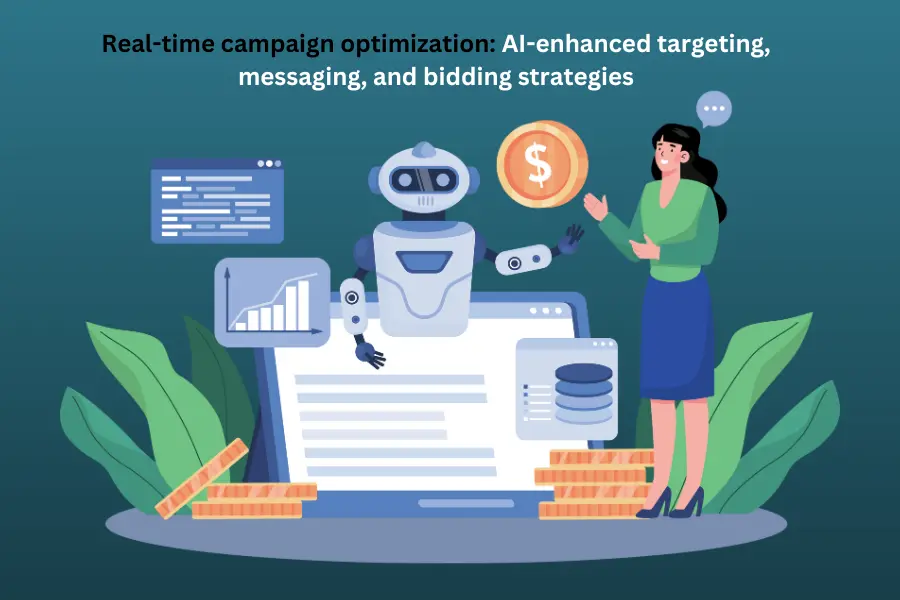Real-Time Campaign Optimization: AI-Enhanced Targeting, Messaging, and Bidding Strategies
In the rapidly evolving digital marketing landscape, real-time campaign optimization has become essential for maximizing the effectiveness of marketing efforts. AI-enhanced targeting, messaging, and bidding strategies allow marketers to dynamically adjust their campaigns based on real-time data and insights, ensuring higher engagement, conversions, and return on investment (ROI). This article explores how AI technologies contribute to real-time campaign optimization and the benefits they bring.

AI-Enhanced Targeting
- Behavioral Analysis: AI algorithms analyze user behavior across various digital touchpoints, including website interactions, social media activity, and purchase history. By understanding these behaviors, AI can identify patterns and predict future actions, enabling marketers to target audiences more effectively.
- Audience Segmentation: Traditional segmentation methods often rely on static demographic data. AI, however, can create dynamic segments based on real-time data, such as recent search queries, content engagement, and purchasing intent. This allows for more precise targeting of ads to the right audience at the right time.
- Lookalike Audiences: AI can identify and target lookalike audiences who share similar characteristics and behaviors with a company's existing high-value customers. This expands the reach to potential new customers who are likely to convert, thereby increasing the efficiency of the marketing efforts.
AI-Enhanced Messaging
- Personalized Content: AI enables the creation of highly personalized content by analyzing user preferences and behavior. For example, email marketing platforms can use AI to personalize subject lines, body text, and product recommendations based on individual recipient data. This level of personalization increases the relevance of the message and engagement rates.
- Dynamic Content Adjustment: AI-driven tools can adjust messaging in real-time based on user interactions. For instance, a visitor who spends significant time on a particular product page might see personalized ads featuring that product on social media or receive targeted follow-up emails. This ensures that the messaging remains relevant and timely.
- Natural Language Processing (NLP): AI technologies, such as NLP, can analyze customer feedback and social media comments to gauge sentiment and intent. This information helps in crafting messages that resonate with the audience's current mood and interests, enhancing the overall impact of the campaign.
AI-Enhanced Bidding Strategies
- Real-Time Bidding (RTB): AI algorithms power real-time bidding platforms, allowing advertisers to bid for ad impressions in real-time. These algorithms assess the value of each impression based on the user's profile and likelihood to convert, ensuring that bids are placed optimally to maximize ROI.
- Budget Optimization: AI can continuously monitor and adjust budget allocation across different channels and campaigns based on performance data. By analyzing which campaigns are delivering the best results, AI reallocates budgets to the highest-performing areas, ensuring optimal use of marketing resources.
- Predictive Bidding: AI uses historical data and predictive analytics to forecast future performance and adjust bidding strategies accordingly. This proactive approach helps in optimizing bids for peak times, user segments, and ad placements, increasing the chances of achieving desired outcomes.
Benefits of Real-Time AI-Enhanced Campaign Optimization
- Increased Efficiency: Automation of targeting, messaging, and bidding processes reduces the manual workload for marketers, allowing them to focus on strategic planning and creative tasks. This increases overall efficiency and productivity.
- Higher Conversion Rates: Personalized and timely messaging, combined with precise targeting and optimized bidding, leads to higher engagement and conversion rates. AI ensures that ads are shown to the right people at the right time with the right message, significantly improving campaign effectiveness.
- Cost Savings: By optimizing bids and budgets in real-time, AI helps in reducing wasted ad spend. Ads are placed more strategically, ensuring that marketing dollars are spent where they are most likely to generate returns.
- Competitive Advantage: Companies that leverage AI for real-time campaign optimization gain a competitive edge by being able to react swiftly to market changes and user behaviors. This agility allows them to stay ahead of competitors and capture market opportunities more effectively.
Implementing AI-Enhanced Campaign Optimization
- Choosing the Right Tools: Selecting the right AI-driven tools and platforms is crucial for successful implementation. It’s essential to evaluate the capabilities, integrations, and user-friendliness of these tools to ensure they meet the business's specific needs.
- Continuous Monitoring and Adjustment: AI systems require continuous monitoring and adjustment to ensure optimal performance. Regularly reviewing campaign data and making necessary tweaks based on insights helps in maintaining effectiveness.
- Data Privacy Compliance: With the increased use of AI and data analytics, ensuring compliance with data privacy regulations is critical. Businesses must implement robust data security measures and be transparent with users about data collection and usage practices.
AI-enhanced targeting, messaging, and bidding strategies are transforming how businesses optimise their marketing campaigns in real-time. By leveraging AI technologies, marketers can achieve greater precision, efficiency, and effectiveness in their campaigns. The benefits of real-time campaign optimization include increased conversion rates, cost savings, and a competitive advantage, making AI an indispensable tool in modern digital marketing. Effective implementation requires choosing the right tools, continuous monitoring, and adherence to data privacy regulations, but the rewards of AI-driven
Active Events
The Future of SEO: Master Today's Trends for Tomorrow's Success
Date: April 30, 2025 | 7:00 PM(IST)
7:00 PM(IST) - 8:10 PM(IST)
2451 people have registered
Laying the Groundwork: Python Programming and Data Analytics Fundamentals
Date: April 30, 2025 | 7:00 Pm
7:00 Pm - 8:00 Pm
2811 people have registered
Bootcamps
Digital Marketing Bootcamp
- Duration:4 Months
- Start Date:May 10, 2025
Data Science Bootcamp
- Duration:4 Months
- Start Date:May 10, 2025
